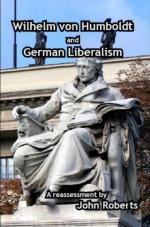|
This section contains 1,644 words (approx. 6 pages at 300 words per page) |

|
Wilhelm von Humboldt, the Prussian statesman, humanist, and linguistic scholar, was born in Potsdam; a younger brother was the scientist and explorer Alexander von Humboldt. Wilhelm von Humboldt's early education was placed in the hands of private tutors and was augmented by private instruction in Greek, philosophy, natural law, and political economy from distinguished men of Germany's Enlightenment. From these youthful studies Plato's idea of the soul and Gottfried Wilhelm Leibniz's concept of force left lasting impressions on his thought.
During and after his university years at Frankfurt an der Oder (1787) and at Göttingen (1788–1789), Humboldt began to question the rationalistic presuppositions of the Enlightenment. Like Johann Gottfried Herder, he viewed human society as a manifold of organic forces, closer to nature than to reason, and came to believe that true knowledge of humanity depended on the cultivation not of pure analytical...
|
This section contains 1,644 words (approx. 6 pages at 300 words per page) |

|


